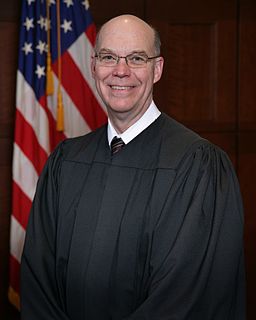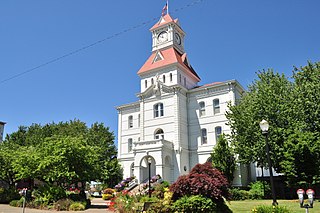This is a list of notable events in the history of LGBT rights that took place in the year 2004.

Utah Constitutional Amendment 3 was an amendment to the Utah state constitution that sought to define marriage as a union exclusively between a man and woman. It passed in the November 2, 2004, election, as did similar amendments in ten other states.

Andersen v. King County, 138 P.3d 963, formerly Andersen v. Sims, is a Washington Supreme Court case in which eight lesbian and gay couples sued King County and the state of Washington for denying them marriage licenses under the state's 1998 Defense of Marriage Act (DOMA), which defined marriage as between a man and a woman. The court ruled that banning same-sex marriage is constitutional since the legislature could reasonably believe it furthers the government interest in promoting procreation.
Same-sex marriage is legal in the U.S. state of California, and first became so on June 16, 2008, when the state began issuing marriage licenses to same-sex couples as the result of the Supreme Court of California ruling in In re Marriage Cases, which found that barring same-sex couples from marriage violated the state's Constitution. The issuance of those licenses was halted during the period of November 5, 2008 through June 27, 2013 due to the passage of Proposition 8—a state constitutional amendment barring same-sex marriages. The granting of same-sex marriages recommenced following the United States Supreme Court decision in Hollingsworth v. Perry, which restored the effect of a federal district court ruling that overturned Proposition 8 as unconstitutional.

Many U.S. states enacted amendments to their state constitutions which prevented the recognition of some or all types of same-sex unions, but all such amendments were struck down by the Supreme Court of the United States on June 26, 2015, in the case of Obergefell v. Hodges. Some amendments prevented a state from legalizing same-sex marriage, civil unions and domestic partnerships, while others banned only same-sex marriage. By May 2012, voters in 30 states had approved such amendments. While the actual text of these amendments still remains written into the various state constitutions, the Obergefell decision has rendered them unenforceable insofar as they prevented same-sex couples from marrying.
Same-sex marriage has been legally recognized in Oregon since May 19, 2014, when a U.S. Federal District Court judge ruled that Oregon's 2004 state constitutional amendment banning such marriages discriminated on the basis of sexual orientation in violation of the Equal Protection Clause of the Federal Constitution. A campaign that was then under way to win voter approval of a constitutional amendment legalizing same-sex marriage was suspended following the decision. In July 2015, the Governor of Oregon signed into law a bill passed by the state Legislature to codify gender-neutral marriage in various Oregon statutes. The law change went into effect on January 1, 2016.

Ballot Measure 2 of 1998 is a ballot measure, since ruled unconstitutional, that added an amendment to the Alaska Constitution that prohibited the recognition of same-sex marriage in Alaska. The Ballot measure was sparked by the lawsuit filed by Jay Brause and Gene Dugan, after the two men were denied a marriage license by the Alaska Bureau of Vital Statistics. In Brause v. Bureau of Vital Statistics, 1998 WL 88743, the Alaska Superior Court ruled that the state needed compelling reason to deny marriage licenses to same-sex couples and ordered a trial on the question. In response, the Alaska Legislature immediately proposed and passed Resolution 42, which became what is now known as Ballot Measure 2. Ballot Measure 2 passed via public referendum on November 3, 1998, with 68% of voters supporting and 32% opposing. The Bause case was dismissed following the passage of the ballot measure.
Nebraska Initiative 416 was a 2000 ballot initiative that amended the Nebraska Constitution to make it unconstitutional for the state to recognize or perform same-sex marriage or civil unions. The referendum was approved on November 7, 2000, by 70% of the voters. The initiative has since been struck down in federal court and same-sex marriage is now legally recognised in the state of Nebraska.
Same-sex marriage has been legally recognized in the U.S. state of Wisconsin since October 6, 2014, upon the resolution of a lawsuit challenging the state's ban on same-sex marriage. On October 6, the U.S. Supreme Court refused to hear an appeal of an appellate court ruling in Wolf v. Walker that had found Wisconsin's ban on same-sex marriage unconstitutional. The appellate court issued its order prohibiting enforcement of the state's ban on same-sex marriage the next day and Wisconsin counties began issuing marriage licenses to same-sex couples immediately.

Arizona Proposition 102 was an amendment to the constitution of the state of Arizona adopted by a ballot measure held in 2008. It added Article 30 of the Arizona Constitution, which says: "Only a union of one man and one woman shall be valid or recognized as a marriage in this state." The amendment added a constitutional ban on same-sex marriage to existing statutory bans in place since 1996. In October 2014, Article 30 of the Arizona Constitution was struck down as unconstitutional in the United States District Court for the District of Arizona, and is no longer enforced by the state of Arizona, which now allows and recognizes same-sex marriages.
Florida Amendment 2 is an amendment made to the Constitution of Florida in 2008. It added Article I, Section 27 to the constitution, which defines marriage as a union only between one man and one woman, and thus bans the creation of similar unions, such as civil unions or same-sex marriage.

Joseph F. Bataillon is a Senior United States District Judge of the United States District Court for the District of Nebraska.
The U.S. state of Montana has recognized same-sex marriage since a federal court ruled the state's ban on same-sex marriage unconstitutional on November 19, 2014. It had previously denied marriage rights to same-sex couples by statute since 1997 and in its State Constitution since 2004. The state appealed the ruling to the Ninth Circuit Court of Appeals, but before that court could hear the case, the U.S. Supreme Court struck down all same-sex marriage bans in the country, mooting any remaining appeals.
Citizens for Equal Protection v. Bruning, 455 F.3d 859, was a federal lawsuit filed in the United States District Court for the District of Nebraska and decided on appeal by the United States Court of Appeals for the Eighth Circuit. It challenged the federal constitutionality of Nebraska Initiative Measure 416, a 2000 ballot initiative that amended the Nebraska Constitution to prohibit the recognition of same-sex marriages, civil unions, and other same-sex relationships.
Same-sex marriage has been legally recognized in the U.S. state of Alaska since October 12, 2014, with an interruption from October 15 to 17 while state officials sought without success to delay the implementation of a federal court ruling. A U.S. District Court held on October 12 in the case Hamby v. Parnell that Alaska's statutory and constitutional bans on same-sex marriage violated the Due Process and Equal Protection clauses of the United States Constitution. On October 15, state officials obtained a two-day stay from the Ninth Circuit Court of Appeals, which the United States Supreme Court refused to extend on October 17.

Lesbian, gay, bisexual, and transgender (LGBT) persons in the U.S. state of Oregon have the same rights and responsibilities as heterosexuals. Same-sex sexual activity is legal in Oregon. Same-sex marriage has been legal in the state since May 2014, when a federal judge declared the state's constitutional ban on such marriages unconstitutional. Previously, same-sex couples could only access domestic partnerships, which guaranteed most of the rights of marriage. Additionally, same-sex couples are allowed to jointly adopt. Discrimination based on sexual orientation and gender identity in the areas of employment, housing and public accommodations is outlawed in the state under the Oregon Equality Act, enacted in 2008. Conversion therapy on minors is also illegal.

Maine Question 1 was a voter referendum on an initiated state statute that occurred November 6, 2012. The title of the citizen initiative is "An Act to Allow Marriage Licenses for Same-Sex Couples and Protect Religious Freedom". The question that appeared on the ballot was: "Do you want to allow the State of Maine to issue marriage licenses to same-sex couples?"
Same-sex marriage has been legally recognised in the U.S. state of Nebraska since June 26, 2015, when the U.S. Supreme Court in the case of Obergefell v. Hodges ruled the denial of marriage rights to same-sex couples unconstitutional. Following the Court's ruling, the Attorney General of Nebraska announced that the state would comply with the ruling.
Same-sex marriage in Arkansas is legal under the U.S. Supreme Court decision in Obergefell v. Hodges, a landmark case in which same-sex marriage bans were struck down on June 26, 2015. Prior to that, same-sex marriage in Arkansas was briefly legal for a period beginning on May 9, 2014, as the result of a ruling by Sixth Judicial Circuit Judge Chris Piazza, striking down the state's constitutional and legislative ban on same-sex marriage as violating the Constitution of the United States. Approximately 541 same-sex couples received marriage licenses in several Arkansas counties before the Arkansas Supreme Court stayed his ruling pending appeal on May 16, 2014.
Lisa H. Naito is an American politician from the state of Oregon. A Democrat, she has served as a state representative and as a Multnomah County commissioner.




















